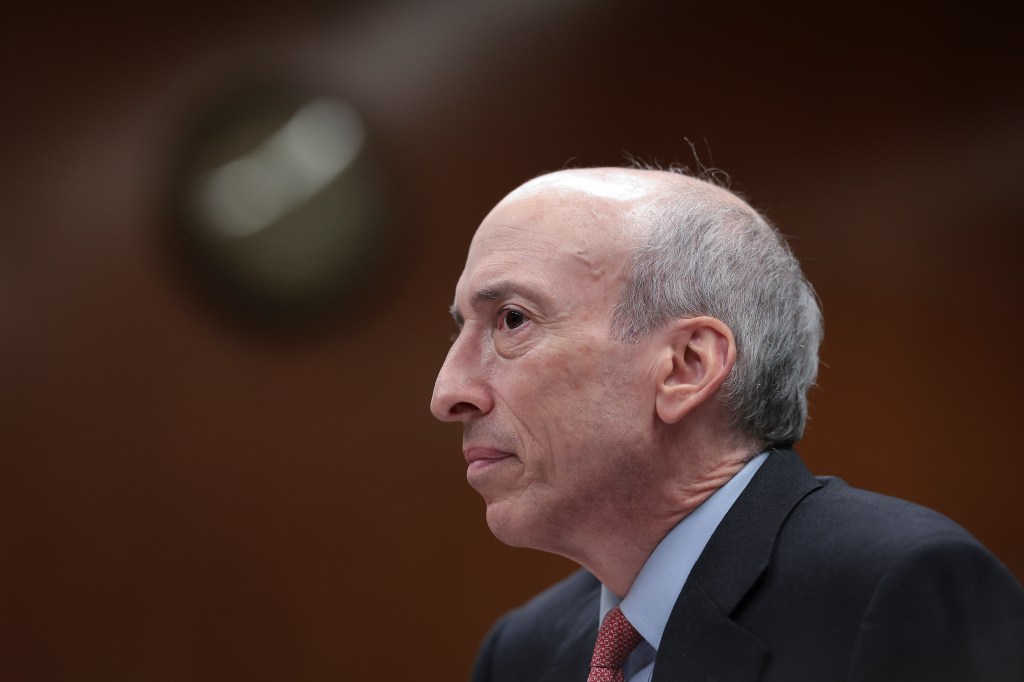The SEC on Wednesday granted approval to spot bitcoin ETFs offered by a number of financial firms, a key regulatory step that will make it easier for ordinary investors to put their money into the digital currency.
The agency approved the following 11 spot bitcoin ETFs:
- BlackRock’s iShares Bitcoin Trust;
- Grayscale Bitcoin Trust;
- ARK 21Shares Bitcoin ETF;
- Bitwise Bitcoin ETP Trust;
- WisdomTree Bitcoin Fund;
- Fidelity Wise Origin Bitcoin Trust;
- VanEck Bitcoin Trust;
- Invesco Galaxy Bitcoin ETF;
- Valkyrie Bitcoin Fund;
- Hashdex Bitcoin ETF;
- Franklin Bitcoin ETF.
The SEC’s approval comes one day after hackers took over the SEC’s X account to falsely trumpet the agency’s bitcoin ETF approval in a post. The regulator and SEC Chairman Gary Gensler both took to X – formerly Twitter – on Tuesday evening to disavow the false announcement.
In the statement issued by the SEC, Gensler references August’s ruling by the US Court of Appeals for the DC Circuit that said the regulator had to review an application made by crypto firm Grayscale to to convert its Bitcoin Trust into an ETF. The judge said that without a “coherent explanation” of why the application was being denied, any denial appeared to be “unlawful”.
“If we look for an analogy, gold jumped approximately 250% four months after its first ETF approval and launched an eight-year bull run.”
Michael Silberberg, Head of Investor Relations, Alt Tab Capital
Gensler acknowledged “circumstances have changed” in the statement explaining why the SEC was now approving spot bitcoin ETFs, and said: “I feel the most sustainable path forward is to approve the listing and trading of those spot bitcoin ETP shares”.
But SEC commissioner Hester Pierce, a long-time critic of the SEC’s approach in this area who has gained the nickname ‘Crypto Mom’, didn’t hold back, drawing on Shakespeare to issue a statement headlined Out, damned spot! Out, I say. “We squandered a decade of opportunities to do our job,” she wrote, adding: “Today marks the end of an unnecessary, but consequential, saga”.
Those consequences, she said, are that retail investors “have been driven to less efficient means of attaining bitcoin exposure in the securities markets”. And she added: “Our arbitrary and capricious treatment of applications in this area will continue to harm our reputation far beyond crypto. Diminished trust from the public will inhibit our ability to regulate the markets effectively”.
But, predictably, industry reaction was positive. Bradley Duke, Chief Strategy Officer at ETC Group, said: “The approval of the US spot bitcoin ETFs by the SEC and also the Hong Kong Securities Commission announcement that it too will approve spot bitcoin ETFs, goes far to legitimise bitcoin as an investable global asset.
“Here in Europe, we have had secure and efficient spot Bitcoin ETPs for over 3.5 years and we are spoiled for choice with the range of physically-backed crypto ETPs available including many different single-asset Crypto ETPs as well as broad market index products.”
“Circumstances have changed.”
Gary Gensler, Chair, SEC
And Michael Silberberg, Head of Investor Relations at Alt Tab Capital, said: “With Blackrock, Fidelity, Franklin, and Galaxy amongst the parties seeking BTC Spot ETF licenses, and further partnerships from JP Morgan and Goldman leaked recently, it is no surprise that the SEC has moved forward with what is industry consensus and granted these long-delayed licenses.
“In the short term, we expect continued frothy price accumulation on this news as capital flows into the market from a new class of institutional buyers to crypto looking to hedge with BTC, make these products part of their treasury management, and invest in the future of money itself. If we look for an analogy, gold jumped approximately 250% four months after its first ETF approval and launched an eight-year bull run.
“Even as we welcome these vehicles to the market, it’s important to remind investors of all classes that these vehicles will come with restrictions such as cash-only creation/redemption and liquidity tied to market hours.”













